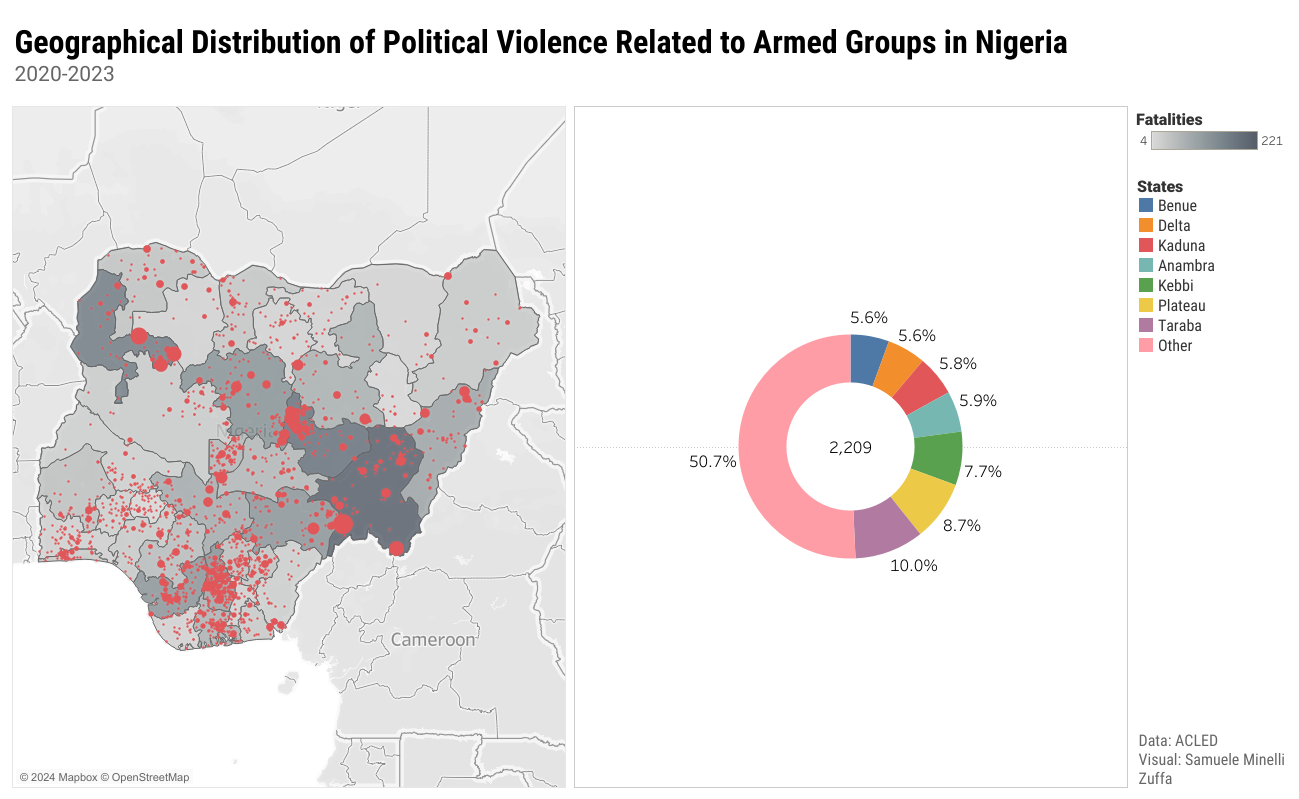
Extremism in Southern Africa: Focus on ISCAP-Mozambique
April 3, 2024
Niger: Quarter 1 2024 Assessment & Forecast
April 19, 2024ESCALATING BANDITRY IN NIGERIA: STRATEGIC IMPLICATIONS
Analysts: Cleopatra O.
Senior Editor: Magdalena Breyer
What You Should Know
- OPERATIONAL REGION: Over the last 15 years, bandits have established strongholds in certain Local Government Areas (LGAs) in northwestern Nigeria and expanded their operations to the north-central and select southern states of the country. They use vast unmanned forests as bases to conceal their activities.
- GOALS: Bandits operate without any ideological objectives, primarily driven by financial motives. The connections with Ansaru in northwestern and central Nigeria, Boko Haram in the northeast, and other jihadist groups in the Sahel, are mainly for acquiring weapons and recruitment
- SHIFT IN TACTICS: Between 2020 and early 2024, bandit activities evolved from robberies, cattle rustling, and communal clashes to mass abductions for ransom, targeting security forces, exploiting natural resources such as gold, and collaborating with jihadist organisations for advanced weaponry.
- IMPACT: The bandits' operations have caused mass displacement, widespread insecurity, and economic drain. Determining the precise impact of banditry will likely remain challenging due to the broad range of activities under the "banditry" label and the decentralised nature of bandit groups.
- 2024 FORECAST: Bandits are likely to expand southward into states surrounding their current areas of operation, including Kebbi, Kaduna, and Plateau. Violence and attack sophistication will likely increase as they gain more resources and access to broader arms smuggling networks through cooperation with jihadist organisations. These dynamics will likely enable them to challenge security forces more directly and possibly spread their activities beyond central Nigeria into surrounding southeastern and western states. Persistent poverty and inequality will likely fuel the recruitment of disaffected youth into bandit gangs, particularly in regions with limited economic opportunities.
Actor Overview
Banditry in Nigeria evolved from the long-standing herder-farmer conflict, caused by environmental degradation and competition for water and arable land. The convergence of this conflict with unemployment, widespread poverty, and weak governance further fueled criminal activities used as survival means. Throughout the late 2000s and early 2010s, criminality that originated in Zamfara state expanded into neighbouring states like Sokoto, Niger, Kaduna, Katsina, and Kebbi. Although the crisis stems from complex economic, political, and social issues, it has been sustained by the military’s response, which has enabled the involved parties to acquire sophisticated weapons to counter the Nigerian forces.

Today, the conflict involves multiple actors, ethnic dimensions, and expansion beyond border communities into southern parts of the country and states across the Nigerian border. Escalation of the conflict has been further facilitated by the prevalence jihadist groups across the Sahel. The proliferation of arms through large-scale arms smuggling has significantly increased the lethality of the bandit gangs. Under-equipped government forces in these rural areas, struggling with the challenging terrain, have been unsuccessful in effectively combating the bandits, causing insecurity to persist and intensify.
Timeline & Trends
2nd half of 2021
Bandits begin targeting police stations more frequently, indicating a shift towards direct confrontation with security forces.July 2021
Bandits shoot down a military jet, evidencing their increasing access to sophisticated weaponry.October 2021
Women are involved in arms trade and smuggling, suggesting diversification in their operational methods.September 2021
Boko Haram fighters train bandits in the use of anti-aircraft guns and explosives, highlighting a collaboration between these groups.January 2022
The Nigerian government officially designates bandits as terrorists.February 2022
Bandits use improvised explosive devices (IEDs) against Nigerian security forces, demonstrating a shift towards more lethal tactics.March 2022
Bandits target a passenger train in Kaduna, underscoring their capability to strike high-profile targets.
Significant Mass Abduction Dates:
- Dec 19, 2020: 80 school students in Katsina
- Feb 26, 2021: 312 girls in Jangebe, Zamfara
- May 30, 2021: 169 pupils, Tegina, Niger
- July 6, 2021: 100 students in Chikun Kaduna State
- March 7, 2024: 284 students in Kuriga, Kaduna
Objectives & Strategy
The bandits are primarily driven by financial incentives, evident in their recurrent kidnappings for ransom, lootings, and other resource-based criminal activities. Their objectives do not extend to establishing regional governance, despite their seized control of certain local governments and communities. Bandit groups share resentment towards the Nigerian government, stemming from its alleged neglect in providing essential services. The bandits use this sentiment to control local communities, using them as informants and offering them protection against other bandit groups.
Tactics and Techniques in 2023
According to data from the Armed Conflict Location & Event Data (ACLED), bandits
Use of Heavy Weapons and Artillery
Bandits have access to heavy weapons such as Assault Rifles, General Purpose Machine Guns (GPMG), and rocket-propelled grenades (RPGs), enhancing their offensive capabilities against Nigerian security forces.
Swarming Technique
Bandits employ a swarming technique using motorcycles, leveraging their numerical strength and mobility to overwhelm adversaries. They coordinate large-scale attacks to disorient and exhaust security forces, maximising operational impact while minimising their own casualties.
Sending Letters to Victims Before an Attack
Bandits often send letters to potential victims before attacks to instil fear and uncertainty. These letters serve to intimidate and warn, heightening anxiety in affected communities. By employing psychological warfare, bandits seek to exert control and assert dominance in the region.
Structure & Composition
Banditry lack a clear hierarchy, but several key leaders have emerged within their respective gangs, including:
- Halilu Sububu, operates in Zamfara and oversees mining operations
- Bello Turji Gudde, active in Eastern Sokoto
- Shehu Rekep, involved in firearms trade in Zamfara
- Abubakar Abdullahi (Dogo Gide), operated in Niger and Kaduna States before his reported death
- Auwalun Daudawa (late) and Dangote Bazamfare, prominent in Katsina
These leaders command varying numbers of followers or foot soldiers, with an estimated 30,000 armed men and 100 identified gangs active nationwide. The organisation primarily recruits from local civilians, including armed minors and young adults. Members generally lack formal military training but show a strong inclination towards using firearms.
Resources & Funding
Looting
Looting provides immediate resources and intimidates local communities. Bandits often take over the homes of fleeing residents.
Mass Abductions
Homes, schools, and hospitals are some of the main targets for mass abductions. Bandits often abduct large numbers of people, and target prominent figures, to demand large ransoms from their families or communities.

Exploiting Natural Resources
Illegal gold mining is a key funding source. Bandits took over artisanal mining activities in Zamfara after locals initially recruited them to secure the mines. They have been able to monopolise the regional mines and generate profit for their activities, often abducting or coercing local residents to work for them.
Taxation and Extortion
Bandits levy taxes upon local communities, especially farmers and villagers, allegedly for protection. Displaced farmers must often pay to regain access to their lands to harvest their crops. This coercive imposition of taxes reinforces the bandits' dominance within the territories under their control.
Insurgency in the Sahel
Certain bandit groups have connections with jihadist organisations such as Boko Haram in northeastern Nigeria and the Islamic State Sahel Province (ISSP) in Niger. These ties facilitate an escalating arms race, with abduction revenues often used to purchase weapons from these groups.
Area of Operation

Banditry is significant in northwestern Nigeria, expanding southward from Sokoto, Katsina, and Zamfara into Kebbi, Kaduna, Kano, Plateau, Taraba, Nasarawa, and even reaching the Federal Capital Territory (Abuja). In southern Nigeria, attacks and threats have occurred in communities across Kwara, Oyo, Ogun, Ekiti, Ondo, Edo, Delta, Enugu, Benue, Anambra, Imo, and Ebonyi states, with sporadic incidents elsewhere.
Operational Bases
- Sokoto: Isa, Sabon Birni, Gwadabawa, Illela, Tangaza, and Goronyo LGAs
- Katsina: Jibia, Batsari, Danmusa, Kankara, Faskari, Sabuwa, Dandume and Safana LGAs
- Zamfara: in all the 14 LGAs; Zurmi, Maradun, Talata Mafara, Gusau, Kaura Namoda, Bungudu, Chafe, Maru, Anka, Bukkuyum, Gummi, Bakura, Birin Magaji/Kiyaw and Shinkafi
- Kebbi: Danko, Wasagu, Fakai, Sakaba and Zuru LGAs
Assessment of Bandits' Impact
The International Organization for Migration's Displacement Tracking Matrix reported approximately 1,092,196 Internally Displaced Persons (IDPs) across northwestern and central Nigeria by December 2023, a 1.5% increase since September 2023, with 45% of these displacements due to armed banditry and kidnapping. Bandits have denied people access to their homes and restricted access to livelihoods and essential services like education and healthcare. The trend of farmers paying for access to their own land increasingly undermines the authority of the Nigerian government. Persistent assaults on roads have severely limited freedom of movement, instilling fear among civilians.
Bandits significantly impact the gold mining industry, which is economically vital for Nigeria. Their presence has allowed foreign actors to infiltrate the mining sector, reducing profitability and impeding regional economic activities. This situation drains the Nigerian economy and hinders economic prospects.
The existence of jihadist groups across the Nigerian border supplies the bandits with arms, exacerbating arms proliferation in Nigeria, with the country reportedly accounting for 70% of the 500 million illegal weapons in West Africa. These groups and bandits conduct simultaneous and sporadic attacks on civilians. According to the ACLED conflict exposure calculator, over 36 million Nigerians are exposed to conflict, leaving a significant portion of the population in constant insecurity and fear. The convergence of these criminal activities and extremist ideologies poses a substantial threat to national and regional security and stability.
Concealment Areas
Bandits exploit unmanned forests for concealment and evasion, including:
- Rugu Forest (between Kaduna, Katsina, and Zamfara)
- Kabakawa (Katsina)
- Sambisa (Borno)
- Kajuru, Kamuku, Rijana, Kagoro and Katari (Forests in Kaduna)
- Kuyambana, Ajja, Burwaye, and Sububu (Zamfara)
- Kuduru (between Kaduna and Niger state)
- Falgore Forest (Kano)
- Balmo, Baranda, and Bagadaza (Forests in Jigawa)
- Forests and forest reserves in Oyo, Ekiti, Benue and Enugu
Forecast
Banditry in Nigeria will very likely continue to expand across geographical regions in 2024. The established operational bases in Sokoto, Katsina, and Zamfara will likely serve as launching pads for further incursions into neighbouring territories like Kebbi, Kaduna, and Plateau. This expansion will likely be driven by the pursuit of new sources of revenue, the exploitation of emerging opportunities for criminal activity, and the desire to evade government crackdowns in traditional strongholds. The spread into new territories will likely exacerbate existing security challenges and deepen socio-economic inequalities, increasing vulnerability of local populations to bandit attacks, displacement, and economic exploitation. Mass abductions will very likely persist as a primary tactic to generate funds for arms and expansion.
There will likely be increased collaboration between extremist and bandit groups in northern Nigeria. The convergence of ideologies and criminal activities is very likely to escalate violence and undermine anti-terrorism and anti-banditry efforts. Support from jihadist groups like Boko Haram and the ISSP will likely provide bandits with arms, training, and financing, likely leading to more sophisticated attacks against security forces and civilians. This partnership will likely complicate efforts to address violence roots, possibly exacerbating inter-communal tensions and deepening societal divisions.
Economic conditions in 2024 will very likely influence the incentives and opportunities for banditry. Persistent poverty and inequality are likely to fuel the recruitment of disaffected youth into criminal gangs, particularly in regions with limited economic opportunities. Fluctuations in commodity prices and disruptions to global supply chains will likely exacerbate socio-economic pressures, likely driving individuals towards illicit activities such as banditry as a means of survival. Banditry is likely to increase across Nigeria over the next six months, with involvement from groups beyond those traditionally active in the northwestern and central regions, as nationwide hardships escalate.
The government’s effectiveness in protecting civilians is very likely to erode public trust and fuel anti-government sentiment over the next 12 months, providing fertile ground for recruitment and radicalisation by extremist and bandit groups. The residents of northwestern Nigeria will likely support local bandit groups in exchange for protection from other bandit groups.



